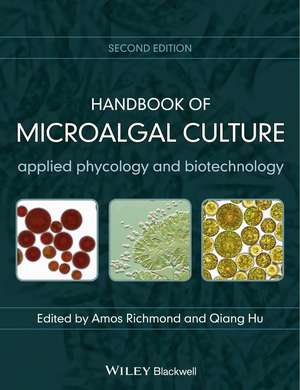Handbook of Microalgal Culture – Applied Phycology and Biotechnology 2e
Autor A Richmonden Limba Engleză Hardback – 9 mai 2013
Preț: 1459.78 lei
Preț vechi: 2137.50 lei
-32% Nou
Puncte Express: 2190
Preț estimativ în valută:
279.32€ • 292.42$ • 231.13£
279.32€ • 292.42$ • 231.13£
Carte indisponibilă temporar
Doresc să fiu notificat când acest titlu va fi disponibil:
Se trimite...
Preluare comenzi: 021 569.72.76
Specificații
ISBN-13: 9780470673898
ISBN-10: 0470673893
Pagini: 736
Dimensiuni: 200 x 251 x 34 mm
Greutate: 1.56 kg
Ediția:2nd Edition
Editura: Wiley
Locul publicării:Chichester, United Kingdom
ISBN-10: 0470673893
Pagini: 736
Dimensiuni: 200 x 251 x 34 mm
Greutate: 1.56 kg
Ediția:2nd Edition
Editura: Wiley
Locul publicării:Chichester, United Kingdom
Public țintă
| Primary Market: Aquaculture engineers, phycologists, pharmaceutical, biofuel and fish feed industry and aquaculture personnel Secondary Market: Libraries in all universities and research establishments where biological, physical and health sciences are studied and taught. Authorities responsible for water supply and water re–use |
Cuprins
Notă biografică
Amos Richmond is Professor Emeritus at the Ben Gurion University of the Negev, Israel, and Founding Director of the Jacob Blaustein Institute for Desert Research, Sede Boker, Israel where he established the Micro-Algal Biotechnology Laboratory.
Qiang Hu is Professor in the College of Technology and Innovation, and Senior Sustainability Scientist at the Global Institute of Sustainability at Arizona State University. He is also co-director of the Arizona Center for Algae Technology and Innovation. Professor Hu has over 25 years of experience in fundamental and applied research on algae in topics ranging from photosynthesis, biosynthesis of lipids and carotenoids, growth physiology of high-density algal culture, photobioreactor system design, and application of algal mass culture technology for biofuels and chemicals, and for environmental bioremediation.
Descriere
Algae are some of the fastest growing organisms in the world, with up to 90% of their weight made up from carbohydrate, protein and oil.
